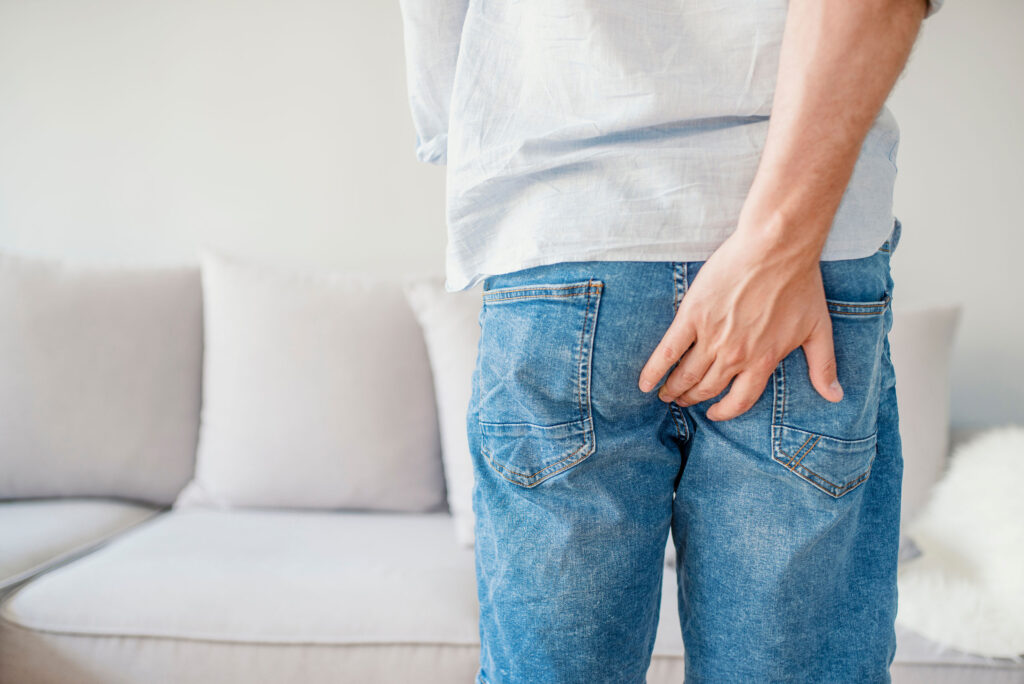When an internal or external hemorrhoid is too filled with blood, it may burst, causing discomfort and bleeding. This post explains what causes them to pop, how to treat a burst hemorrhoid, and when to seek medical attention.

When hemorrhoids become thrombosed, meaning a blood clot forms with the swollen vessels located in or around the rectum and anal opening, they may burst. (Both external and internal hemorrhoids can pop.) If that happens, you may notice bright red blood in your stool, on your toilet paper when you wipe, or in the bowl of the toilet.
In some cases, a ruptured internal hemorrhoid or popped external hemorrhoid can lead to heavy or continuous bleeding; the passing of large blood clots; and severe pain. In such cases, you should seek medical attention in order to prevent complications.
While hemorrhoids can pop, the bursting does not usually pose a serious threat to your health. Rarely, a burst hemorrhoid can lead to ongoing bleeding from the rectum, which could cause adverse health complications if left untreated. Additionally, while bleeding from the rectum is a possible side effect of burst cases, this symptom could also be a sign of colorectal or anal cancer. As such, you should always discuss rectal bleeding with your healthcare provider.
Pregnancy is a risk factor for developing hemorrhoids, as the weight of your growing fetus and the increased blood volume in your body puts added pressure on your lower rectum. As such, many women worry and wonder, can they burst during labor?
During labor, straining and pushing to deliver your child can cause them to form, or worsen existing swelling in the vessels in and around your rectum. This can lead to thrombosed hemorrhoids—especially if you push for longer than 20 minutes—as all that strain directs additional blood into the veins surround the anus. And, since this type are subject to bursting, this increases the chances that a hemorrhoid will pop during labor.
If a hemorrhoid bursts, you may experience bleeding that lasts anywhere between a few seconds to a few minutes. Bleeding after passing a bowel movement may also persist for a few days. Most burst hemorrhoids won’t require medical treatment, although you can reduce any discomfort by soaking the area in three to four inches of warm—not hot—water, for between 15 and 20 minutes. In addition to soothing pain and inflammation, this soak can direct additional blood flow to your rectal area, helping speed the healing process for your burst hemorrhoid.
But what if your burst hemorrhoid bleeds for longer than 10 minutes? In such cases, you should be evaluated by a health care provider to make sure that you’re dealing with a burst hemorrhoid and not a different medical condition. Mention additional symptoms such as changes in the color or consistency of your stool; changes in your bowel movement habits; stomach pain or pain in the anal area; nausea, vomiting or weight loss; lightheadedness or dizziness; and/or fever. All of these symptoms could indicate other conditions that will require further medical interventions.
Can they burst? Yes. But seeking timely hemorrhoids treatment should prevent this outcome. And, if you wish to address grade 2 – 3 internal hemorrhoids without surgery, the experts at the Texas Hemorrhoid Institute are here to discuss Hemorrhoid Artery Embolization (HAE), a minimally invasive procedure that shrinks them by blocking their blood supply. Request a consultationRequest a consultationRequest a consultation today to explore your HAE candidacy.

Scheduling
Please contact our dedicated specialists to schedule a consultation today.
2025 Texas Hemorrhoid Institute. All rights reserved. Website Design by Healthcare Success